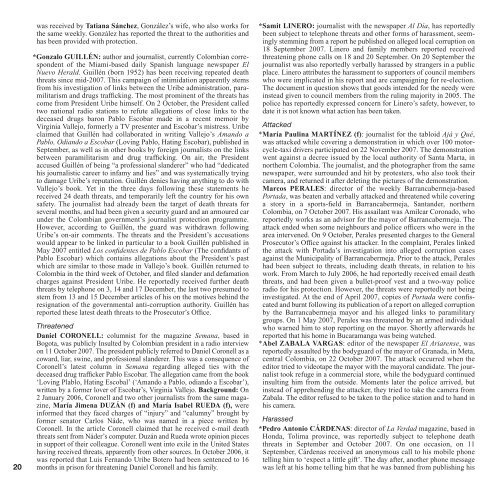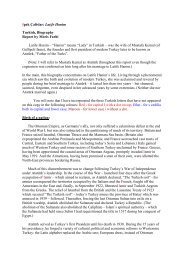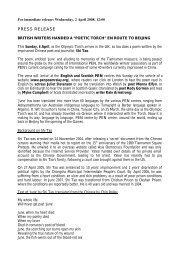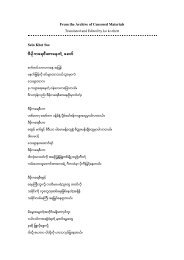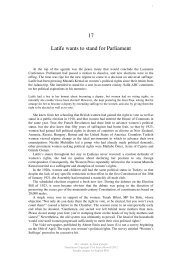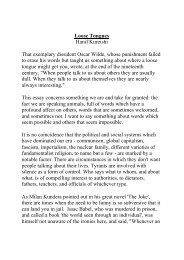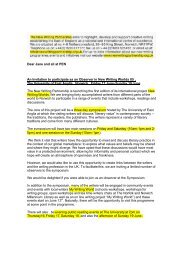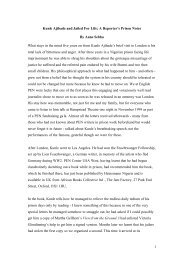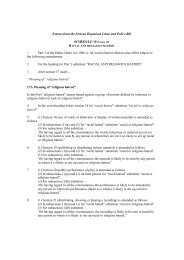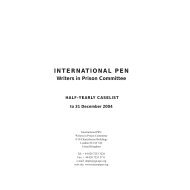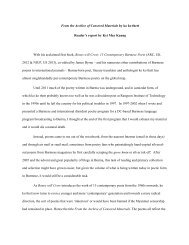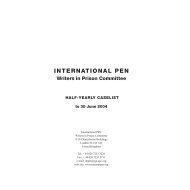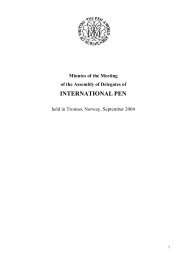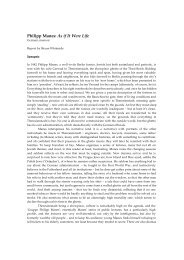Download - English PEN
Download - English PEN
Download - English PEN
Create successful ePaper yourself
Turn your PDF publications into a flip-book with our unique Google optimized e-Paper software.
20<br />
was received by Tatiana Sánchez, González’s wife, who also works for<br />
the same weekly. González has reported the threat to the authorities and<br />
has been provided with protection.<br />
*Gonzalo GUILLÉN: author and journalist, currently Colombian correspondent<br />
of the Miami-based daily Spanish language newspaper El<br />
Nuevo Herald. Guillén (born 1952) has been receiving repeated death<br />
threats since mid-2007. This campaign of intimidation apparently stems<br />
from his investigation of links between the Uribe administration, paramilitarism<br />
and drugs trafficking. The most prominent of the threats has<br />
come from President Uribe himself. On 2 October, the President called<br />
two national radio stations to refute allegations of close links to the<br />
deceased drugs baron Pablo Escobar made in a recent memoir by<br />
Virginia Vallejo, formerly a TV presenter and Escobar’s mistress. Uribe<br />
claimed that Guillén had collaborated in writing Vallejo’s Amando a<br />
Pablo, Odiando a Escobar (Loving Pablo, Hating Escobar), published in<br />
September, as well as in other books by foreign journalists on the links<br />
between paramilitarism and drug trafficking. On air, the President<br />
accused Guillén of being “a professional slanderer” who had “dedicated<br />
his journalistic career to infamy and lies” and was systematically trying<br />
to damage Uribe’s reputation. Guillén denies having anything to do with<br />
Vallejo’s book. Yet in the three days following these statements he<br />
received 24 death threats, and temporarily left the country for his own<br />
safety. The journalist had already been the target of death threats for<br />
several months, and had been given a security guard and an armoured car<br />
under the Colombian government’s journalist protection programme.<br />
However, according to Guillén, the guard was withdrawn following<br />
Uribe’s on-air comments. The threats and the President’s accusations<br />
would appear to be linked in particular to a book Guillén published in<br />
May 2007 entitled Los confidentes de Pablo Escobar (The confidants of<br />
Pablo Escobar) which contains allegations about the President’s past<br />
which are similar to those made in Vallejo’s book. Guillén returned to<br />
Colombia in the third week of October, and filed slander and defamation<br />
charges against President Uribe. He reportedly received further death<br />
threats by telephone on 3, 14 and 17 December, the last two presumed to<br />
stem from 13 and 15 December articles of his on the motives behind the<br />
resignation of the governmental anti-corruption authority. Guillén has<br />
reported these latest death threats to the Prosecutor’s Office.<br />
Threatened<br />
Daniel CORONELL: columnist for the magazine Semana, based in<br />
Bogota, was publicly Insulted by Colombian president in a radio interview<br />
on 11 October 2007. The president publicly referred to Daniel Coronell as a<br />
coward, liar, swine, and professional slanderer. This was a consequence of<br />
Coronell’s latest column in Semana regarding alleged ties with the<br />
deceased drug trafficker Pablo Escobar. The allegation came from the book<br />
‘Loving Plablo, Hating Escobal’ (‘Amando a Pablo, odiando a Escobar’),<br />
written by a former lover of Escobar’s, Virginia Vallejo. Background: On<br />
2 January 2006, Coronell and two other journalists from the same magazine,<br />
María Jimena DUZÁN (f) and María Isabel RUEDA (f), were<br />
informed that they faced charges of “injury” and “calumny” brought by<br />
former senator Carlos Náde, who was named in a piece written by<br />
Coronell. In the article Coronell claimed that he received e-mail death<br />
threats sent from Náder’s computer. Duzán and Rueda wrote opinion pieces<br />
in support of their colleague. Coronell went into exile in the United States<br />
having received threats, apparently from other sources. In October 2006, it<br />
was reported that Luis Fernando Uribe Botero had been sentenced to 16<br />
months in prison for threatening Daniel Coronell and his family.<br />
*Samit LINERO: journalist with the newspaper Al Día, has reportedly<br />
been subject to telephone threats and other forms of harassment, seemingly<br />
stemming from a report he published on alleged local corruption on<br />
18 September 2007. Linero and family members reported received<br />
threatening phone calls on 18 and 20 September. On 20 September the<br />
journalist was also reportedly verbally harassed by strangers in a public<br />
place. Linero attributes the harassment to supporters of council members<br />
who were implicated in his report and are campaigning for re-election.<br />
The document in question shows that goods intended for the needy were<br />
instead given to council members from the ruling majority in 2005. The<br />
police has reportedly expressed concern for Linero’s safety, however, to<br />
date it is not known what action has been taken.<br />
Attacked<br />
*María Paulina MARTÍNEZ (f): journalist for the tabloid Ajá y Qué,<br />
was attacked while covering a demonstration in which over 100 motorcycle-taxi<br />
drivers participated on 22 November 2007. The demonstration<br />
went against a decree issued by the local authority of Santa Marta, in<br />
northern Colombia. The journalist, and the photographer from the same<br />
newspaper, were surrounded and hit by protesters, who also took their<br />
camera, and returned it after deleting the pictures of the demonstration.<br />
Marcos PERALES: director of the weekly Barrancabermeja-based<br />
Portada, was beaten and verbally attacked and threatened while covering<br />
a story in a sports-field in Barrancabermeja, Santander, northern<br />
Colombia, on 7 October 2007. His assailant was Amilcar Coronado, who<br />
reportedly works as an advisor for the mayor of Barrancabermeja. The<br />
attack ended when some neighbours and police officers who were in the<br />
area intervened. On 9 October, Perales presented charges to the General<br />
Prosecutor’s Office against his attacker. In the complaint, Perales linked<br />
the attack with Portada’s investigation into alleged corruption cases<br />
against the Municipality of Barrancabermeja. Prior to the attack, Perales<br />
had been subject to threats, including death threats, in relation to his<br />
work. From March to July 2006, he had reportedly received email death<br />
threats, and had been given a bullet-proof vest and a two-way police<br />
radio for his protection. However, the threats were reportedly not being<br />
investigated. At the end of April 2007, copies of Portada were confiscated<br />
and burnt following its publication of a report on alleged corruption<br />
by the Barrancabermeja mayor and his alleged links to paramilitary<br />
groups. On 1 May 2007, Perales was threatened by an armed individual<br />
who warned him to stop reporting on the mayor. Shortly afterwards he<br />
reported that his home in Bucaramanga was being watched.<br />
*Abel ZABALA VARGAS: editor of the newspaper El Ariarense, was<br />
reportedly assaulted by the bodyguard of the mayor of Granada, in Meta,<br />
central Colombia, on 22 October 2007. The attack occurred when the<br />
editor tried to videotape the mayor with the mayoral candidate. The journalist<br />
took refuge in a commercial store, while the bodyguard continued<br />
insulting him from the outside. Moments later the police arrived, but<br />
instead of apprehending the attacker, they tried to take the camera from<br />
Zabala. The editor refused to be taken to the police station and to hand in<br />
his camera.<br />
Harassed<br />
*Pedro Antonio CÁRDENAS: director of La Verdad magazine, based in<br />
Honda, Tolima province, was reportedly subject to telephone death<br />
threats in September and October 2007. On one occasion, on 11<br />
September, Cárdenas received an anonymous call to his mobile phone<br />
telling him to ‘expect a little gift’. The day after, another phone message<br />
was left at his home telling him that he was banned from publishing his


